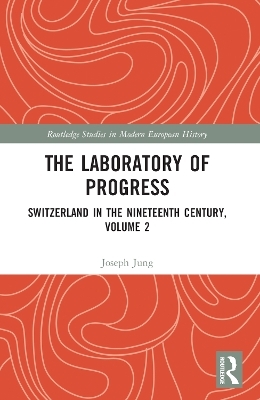
The Laboratory of Progress
Routledge (Verlag)
978-1-032-15228-8 (ISBN)
The Laboratory of Progress: Switzerland in the 19th Century tells the improbable story of how a small, backward, mountainous agricultural country with almost no raw materials became an industrial powerhouse, a hub of innovation, a touristic mecca and a pioneer in transportation – all in the course of a single century.
That a tiny landlocked country should become a dominant steamship builder for the rest of the world; that a country that had never seen a cotton plant should become the world’s second-largest textile producer; that a country with hardly any level terrain should come to boast the world’s most highly developed railway network; and that a country whose main export was impoverished emigrants should be transformed into one of the world’s major financial centres – these astonishing developments, among many others, are explored and explained, both through the specific stories of individual innovators and through a prescient analysis of the political, economic, societal and cultural structures that formed the context in which Switzerland’s astonishing transformation took place.
The book is a compelling read both for professional historians and for general readers with an interest in Switzerland; it highlights the roles of transport networks and individual pioneers in industrial and political development.
Joseph Jung is Professor Emeritus at the University of Fribourg and the author of bestselling biographies of the preeminent Swiss politician Alfred Escher and his daughter Lydia Welti-Escher, among many other works. He has received numerous awards for his pioneering research into 19th-century Swiss economic and cultural history.
1. Lifelines: Interconnecting Systems 1.1. Starting Points and Foundations 1.2. The Interlinking of Transport Systems 1.3. The Development of Railway Tourism 1.4. The Swiss Railway Project 1.5. The Success Story of the Railway 2. Switzerland Unbound: Intrepid Progress 2.1. Get to Know This Pioneering People 2.2. Highlights: From the Helvetic Republic to the Industrialised Welfare State 2.3. The Social Profile of the Pioneers 2.4. The Nation Needs Topographers 2.5. Engineers: Switzerland as Construction Site 2.6. Stonemasons and Reinforced Concrete: The Mechanisation of the Building Trade 2.7. Watches: An Early Swiss Trademark 2.8. Thanks to Cottage Industry, Switzerland Becomes the Second Largest Textile Exporter in the World 2.9. An Abundance of Water: A Rattling Loom on a Rushing Brook 2.10. Heinrich Kunz and the Issue of Social Welfare 2.11. Escher Wyss: From the Textile to the Engineering Industry 2.12. The Engineering Industry: Honegger’s Looms 2.13. Rieter and Sulzer: The Heavyweights from Winterthur 2.14. Sig Neuhausen: Carriages, Weapons and Milk Cartons 2.15. Educational Journeys to England 2.16. The Brown Dynasty: British Know-How Gains Currency 2.17. The Transformation: From Water to Electricity 2.18. Flushing Away Basel’s Chemical Waste 2.19. Steamboats and Chocolates 2.20. Tickets to the Mountaintops 2.21. Dairy Products: From Mountain to Factory 2.22. The Mechanisation of Agriculture 2.23. Commerce: From Generation to Generation 2.24. Doctor Alfred Escher of Zurich: A La Bonne Heure, This Is a Man Comme Il En Faut Pour la Suisse 2.25. Life Insurance: Johann Conrad Widmer 2.26. Transport Insurance, Fire Insurance and Reinsurance: Moritz Grossman 2.27. Disaster in Winterthur: Swiss Lloyd and the Financial Bust 2.28. A Breakneck Pace: Hotel Pioneers and Their Empires 2.29. Swiss Industry in the 19th Century: Dynamics and Structure 3. Headlines: From Developing Country to Laboratory of Progress 3.1. Almost Passed By 3.2. Peace and Threats to Peace 3.3. War on the Doorstep 3.4. Mass Emigration and Italian Migrant Workers 3.5. Synchronisation and Punctuality 3.6. The Changing Faces of Cities 3.7. In Search of the Secret to Quality 3.8. Turning Obstacles into Advantages 3.9. The 1848 Constitution: A Stroke of Genius 3.10. Transport Is the Key to Almost Everything 3.11. Politics and Business, Hand in Hand 3.12. Who Pulls the Strings Behind the Scenes? 3.13. The Ties of Federalism 3.14. The Hour of Big Gambles 3.15. Neutrality and Good Offices 3.16. On the Way to Direct Democracy 3.17. The Swiss Miracle
| Erscheinungsdatum | 05.07.2022 |
|---|---|
| Reihe/Serie | Routledge Studies in Modern European History |
| Übersetzer | Ashley Curtis |
| Zusatzinfo | 7 Tables, black and white; 3 Line drawings, black and white; 37 Halftones, black and white; 40 Illustrations, black and white |
| Verlagsort | London |
| Sprache | englisch |
| Maße | 152 x 229 mm |
| Gewicht | 453 g |
| Themenwelt | Geschichte ► Allgemeine Geschichte ► Neuzeit (bis 1918) |
| Geisteswissenschaften ► Geschichte ► Regional- / Ländergeschichte | |
| Geschichte ► Teilgebiete der Geschichte ► Kulturgeschichte | |
| Naturwissenschaften ► Geowissenschaften ► Geografie / Kartografie | |
| Wirtschaft ► Volkswirtschaftslehre ► Makroökonomie | |
| ISBN-10 | 1-032-15228-1 / 1032152281 |
| ISBN-13 | 978-1-032-15228-8 / 9781032152288 |
| Zustand | Neuware |
| Informationen gemäß Produktsicherheitsverordnung (GPSR) | |
| Haben Sie eine Frage zum Produkt? |
aus dem Bereich


